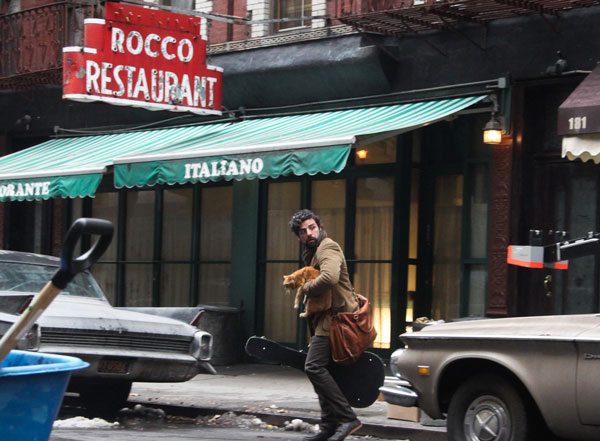
BY ANN VOTAW | My heart ached when Carey Mulligan said, “Meet me at the Reggio,” the Village landmark featured in “Inside Llewyn Davis.”
The scene reminded me of myself at 29, when I sat at the table by the window — the same one where Oscar Isaacs accuses Mulligan of being “square.” Like Llewyn Davis, I feared a conventional life of kids in the suburbs. I also worried about being poor and alone. I brought all these anxieties to the Reggio where Antonio, the Italian manager, listened to me mourn dance auditions, most of them close calls and rejections. He was one of my few friends when I moved to Manhattan a decade ago. The young waitresses called him Tony.
“Tony!” the girls sang one evening when I walked into the brown and green restaurant, alive with the sounds of opera. When he heard his name, Tony put down the Times and stepped behind the counter to prepare pasta just for me. It wasn’t on the menu.
Having moved to the city in 2003, I was broke and getting ripe for the chorus. Tony, in his 60s, knew my need to be on Broadway —to “make it” just because I had moved from Chicago with two suitcases and no backup plan. He appreciated my need for companionship.
“Anna, Anna,” he said, adding a warm “a” to my parochial name. “You look very re-lax-ed.”
I shook my head. I felt stressed, rehearsing a sci-fi parody to beef up my anemic résumé. In my unpaid job as a choreographer, I tried to incorporate unrelated characters into a production number meant to advance the plot. With no stage combat experience, I led fight practice and filled the role of Stormtrooper Ann in a white bioterrorism suit and football helmet.
I was a flop, but his blue eyes scanned the short skirt I wore to my other job as an office temp. He said, “If this were the ’60s and we were in Italy, I would say, ‘Come on. Are you ready?’ ”
Flattered, I grinned at this gray-haired double shot of testosterone. Standing only 5 foot 6 inches to my 5 foot 10, he appeared more courtly than threatening. I welcomed his attention, but relationships confused me. Since my New York arrival, a roommate punched holes through his bedroom door, angry he wasn’t on Broadway. Another roommate, an older Lebanese woman, tracked my whereabouts because she was lonely for a husband; I was the best substitute.
“Everyone here talks about love,” Tony said, shaking his head. “That’s what everyone in New York talks about. Sometimes I look at people here, and I think, ‘Maybe they should get together,’ but they don’t even see each other.”
I scanned the room of mop-haired students, some of them unwashed. I rolled my eyes.
“Nope, no soul mate here,” I said.
I turned my attention to my cup and saucer. They were printed with “Caffe Reggio” in Gothic black type.
“Are these new?”
“You notice things,” Tony said. “I just bought them from Italy. There are beautiful things here. See the painting over there, the one of the woman with the water pitcher. She’s holding up her arms because she thinks the men in the picture want to harm her. But they just want water.”
I marveled at the huge canvas, which I thought was a print. Tony informed me it was real, a 16th-century painting from the school of Caravaggio, probably belonging to the cafe’s original owner. I was struck by the woman’s powerful limbs in contrast to her frightened expression. I wondered how something so priceless could end up in a coffee shop.
I kissed Tony’s cheek and geared up for play practice. At his suggestion, I left $5 on the table for the coffee and a tip for the waitress. The pasta was free.
“Just try not to work so hard,” he said. “And fall in love.”
But I threw myself into the show and rehearsals for a new dance company. I moved into another apartment with two other roommates. It was months before I stopped into the Reggio, when Tony had health concerns. He didn’t elaborate, but he was thinner, grumpier. When I called to check on him, an employee explained that Tony had cancer.
That fall, I knitted him a scarf and left it with the girls. When I visited the Reggio, the acting manager was dressed in a suit. He told me, “I just got back from Tony’s funeral. He got the scarf.”
Stunned, I asked for his daughter’s phone number. Tony had often spoken of her, and now she and I had something in common.
“You don’t know me,” I said on his daughter’s voicemail, “but I am a friend of your dad’s. He was like a father to me when I first moved here. I don’t know where I’d be if he weren’t so nice to me.”
Today, I am a recreational therapist at a senior center in Washington Heights. I dance with these older adults, and I pay my bills on time. I wonder what happened to Llewyn Davis.

































